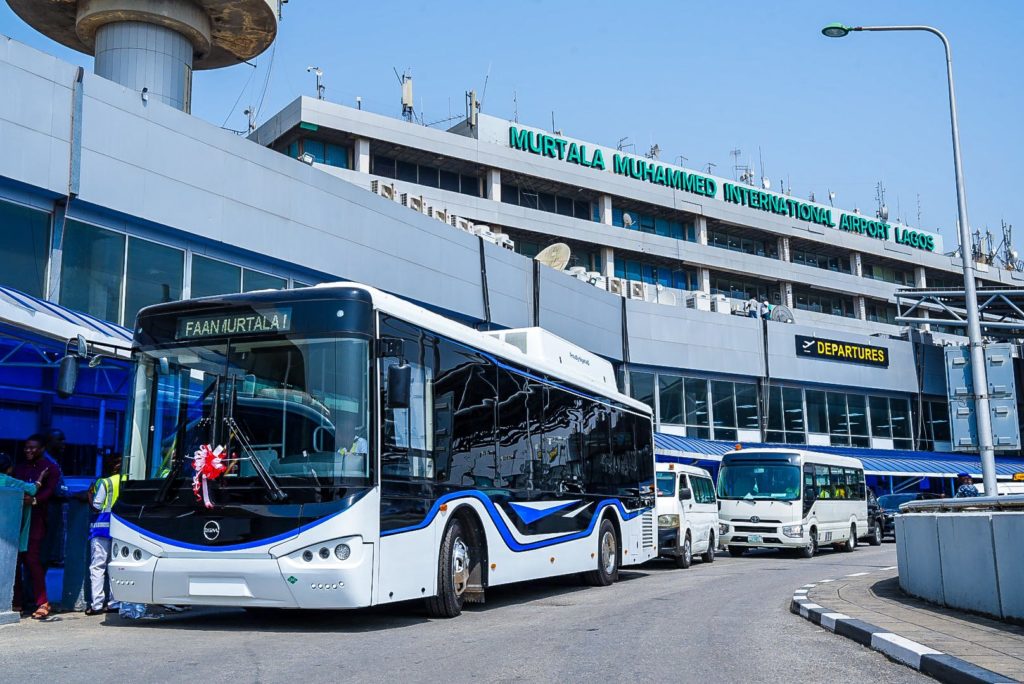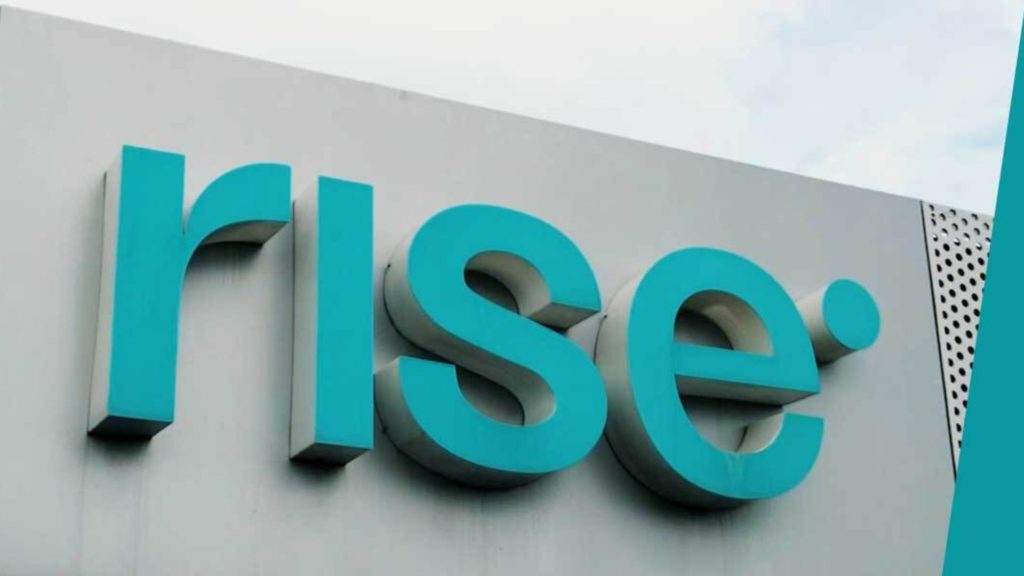
IN PARTNERSHIP WITH

Monday’s here 😭
More economic sanctions have been levied against Russia.
Cogent Communications, one of Europe’s largest internet providers, shut off its service in Russia over its invasion and assault on Ukraine.
PayPal, Visa and Mastercard have also suspended their services in the country as well.
While most of the sanctions are levied to deter Russia’s progression, it appears that its everyday citizens are on the receiving end.
In today’s edition
- Congo is removing its mobile registry tax
- Econet and Ericsson roll out 5G in Zimbabwe
- Can SafeBoda keep its pace in Ibadan’s bike-hailing race?
- TC Insights: What should Africa prioritise?
- Tech probe: Answers
- Job opportunities
CONGO IS REMOVING ITS MOBILE REGISTRY TAX

In more recent years, African governments have been moving to curb the growth of mobile phone theft. It is, however, questionable whether the steps are in the right direction.
Take the Democratic Republic of Congo (DRC), for example. In September 2020, the DRC established the Régistre des Appareils Mobiles (RAM) or the Mobile Device Registry, a central register for mobile devices in the DRC.
Now the Registry has the same function as any mobile registry worldwide. It registers all mobile devices including phones, tablets and laptops, by matching the 15-digit IMEIs to buyers. So when a phone is stolen, users can simply make a complaint at the Registry, confirm their identity, and get the phone blocked.
So what’s the problem?
The DRC emphasised that RAM was established to curb phone theft and the import of counterfeit phones—including faulty subpar phones—but it was also accompanied by a hefty tax.
All mobile device owners are subject to pay $0.17 (for 2G devices) and $1.17 (for 3G and 4G devices) per month for 6 months. What’s more troubling was that the tax would be deducted from the phone credits of each individual, regardless of their approval or willingness. People would recharge their phones and get deductions without being notified.
There are about 41 million mobile device users in the DRC and the government said the earnings from the tax would be divided. Thirty per cent would go to the private service provider recruited to implement the technical set up of the central registry, 25% would go to the regulator, 40% to the government, and 5% to telecom operators.
According to an NGO, the tax brought in about $266 million for the DRC but the government is sceptical about the amount.
The spontaneous deductions—as well as the status of the generated income—have caused citizens to protest the tax since it was announced, especially since most earn less than $1 per day.
What’s happening now?
After months of protests that led to the removal of the tax for 2G devices—used by 75% of the population—in October 2021, the government has announced that it will scrap the tax completely.
The tax ceased on March 1 and the government’s decision is based on the protests from citizens as well as decisions from its National Assembly.
Zoom out: The enactment of mobile taxes is increasing across the continent. Other than Ghana’s e-levy bills, Zimbabwe introduced a similar tax in November 2021, a $50 levy on all new smartphones which is being heavily contested by users.
Yet to get paid for your hilarious tweets?
Simply add Barter to your Twitter profile and start accepting tips and donations from your followers.
Learn how to set up Barter for Tips.
This is partner content.
ECONET AND ERICSSON ROLL OUT 5G IN ZIMBABWE

Speaking of Zimbabwe, a new partnership between telecom Econet and mobile device producer Ericsson will see the rollout of 5G in Harare, the country’s capital.
Econet leads Zimbabwe’s telecoms with 66% of the market share. It also boasts of the most robust 2G, 3G and 4G networks in the country.
With Ericsson, the telecom is targeting 5G too. Last month, the telecoms launched the country’s first 5G network with plans to establish 22 base stations across the country by April. Econet was also the first Zimbabwean telecom to run 5G trials in the country.
Ericsson’s role
Ericsson is providing Econet with the hardware it needs to roll out 5G. The company will deploy its energy-efficient and high-performing Radio Access Network (RAN) and 5G Evolved Packet Core (EPC) which will boost network speeds by 10 times.
Zimbabwe is not Ericsson’s first tango with 5G. The company has minted over 170 commercial 5G deployment contracts across the world including 2 with Airtel Africa and MTN. After Zimbabwe and Nigeria, Econet becomes the third African telecom to partner with Ericsson to bring 5G into Africa.
How many African countries have 5G now?
Sub-Saharan Africa will be the slowest region to adopt 5G across the globe. About 43% of mobile connections on the continent are still 3G connections while 15% are on 4G.
Presently, only 1% of the connections on the continent are 5G and Ericsson predicts that the rate will reach 7% by 2026.
If you’re wondering why the adoption rate is low, it’s cost constraints. 5G is pretty expensive to roll out. A good example is in Nigeria where MTN and Mafab recently paid $273.6 million each in licensing fees. Yup, just licensing.
Presently, only 4 African countries—Nigeria, Kenya, South Africa and now, Zimbabwe—have deployed 5G but at least 14 more including Uganda, Madagascar and Gabon are running trials.
At Busha, we want everyone everywhere in Nigeria to have access to crypto. That’s why you can buy as low as ₦250, set recurring buys, get the best rates, and soon 🤐 on Busha. Join 300,000+ Nigerians already using Busha.
This is partner content.
CAN SAFEBODA KEEP ITS PACE IN IBADAN’S BIKE-HAILING RACE?
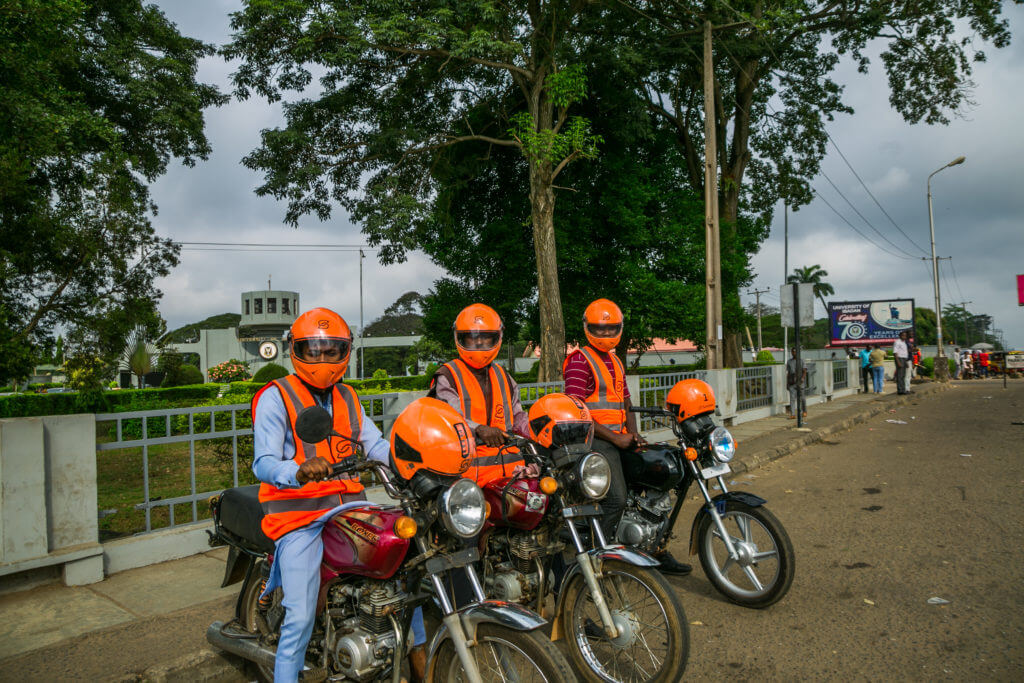
Last week, Ugandan bike-hailing platform, SafeBoda, celebrated its 2-year anniversary in Nigeria.
SafeBoda’s race
Since its kickoff in Ibadan in January 2020, SafeBoda has seen a lot of growth. Its first brilliant move was bypassing Lagos, Nigeria’s largest commercial hub, for Ibadan. The move paid off when the government’s clampdown on bike-hailing in Lagos sent other platforms running.
SafeBoda’s growth since its launch has been groundbreaking. In June 2020, about 6 months after its operation started, it reached a milestone of 100,000 rides. By August 2020, it grew by 150% and recorded 250,000 rides.
By September 2021, a year and a half after launch, SafeBoda had 100,000 registered users, recorded 1 million rides, 8,000 riders, and 1 million recorded rides. In November, the platform was reportedly doing 20,000 rides per day.
Fast forward to its 2nd anniversary, SafeBoda claims to have recorded over 3 million rides, more than 10,000 riders, over 100,000 users and completed 50,000 deliveries.
The startup currently offers 3 services in Nigeria: rides, deliveries, and airtime purchase. The payment vertical which has already launched in Uganda will launch in Nigeria soon.
Will it keep its lead role?
SafeBoda’s growth is due to a lot of things, its people like country director Olaoluwa Aroyoku who led the platform’s drive to 3 million rides. The most important factor, however, is the opportunity in Ibadan, a city with 3.5 million inhabitants.
When SafeBoda launched, the competition it had to face was with other local riders whom it quickly acquired as part of its platform. Now though, more players are in the game and the race for Ibadan is on.
SafeBoda’s success in Ibadan has seen other bike-hailing platforms join the race. There’s MaxNG, ORide, Gokada and now UberMoto which joined recently.
The company isn’t too bothered though. “We have been expecting this to happen and now that it has, we are not worried. Our focus is to keep giving the best experience to our customers and keeping our riders happy and willing to complete more rides daily,” said country director Arokoyu. “The sky is wide enough for all birds to fly; healthy competition is always good for business.”
SafeBoda is one of the most active bike-hailing companies in sub-Saharan Africa as it holds more than 80% market share in Uganda and Nigeria. Uber and Bolt had first launched their bike-hailing product in Uganda but couldn’t beat SafeBoda. Will the same happen in Ibadan?
Fincra provides APIs for making and receiving local & international transfers in EUR, GBP & NGN.
Our APIs fit into all payment applications allowing fintechs to offer virtual bank accounts in multiple currencies.
Sign up for a demo here.
This is partner content.
TC INSIGHTS: WHAT SHOULD AFRICA PRIORITISE?
Africa’s digital skeleton is gradually adding flesh to bone. Countries like Rwanda and Ghana are doing more to achieve digital transformation across basic yet tedious processes with the former launching a one-stop platform for accessing public services in 2015 and the latter digitising national identification.
But there’s still more to be done to drive development, job creation, and economic growth. There are also different areas that African countries who are trying to achieve these could focus on.
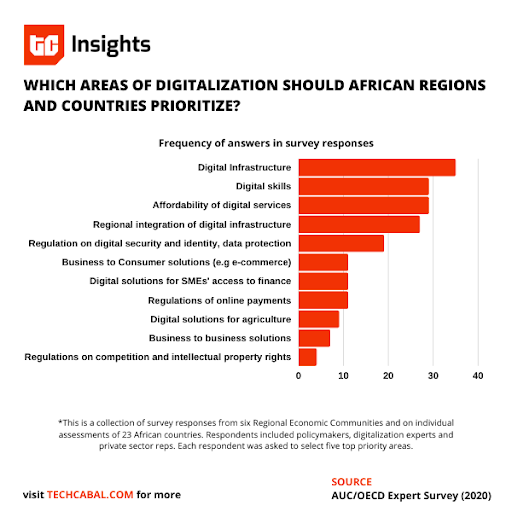
An expert survey by the OECD in 2020 showed that policymakers and other stakeholders believe that when it comes to creating more jobs, providing digital infrastructure should receive greater priority over digital skills, digital solutions for agriculture, and anything else.
Digital infrastructure is a core need and the foundation for a lot of these other areas to function. However, focusing solely on building infrastructure over other components of digitalisation could have more delayed, long-term effects on economic growth compared to others like improving access to finance.
Take South Africa, for instance. Ninety-eight-point-five percent of businesses are SMEs, and they contribute 39% to the country’s GDP. Yet, South Africa has a $30 billion SME financing gap, and analysts predict that about 60% of businesses could shut down due to the spending contractions imposed by the pandemic.
Unlocking growth in South Africa will clearly require paying more attention to SME financing. A priority area should therefore be to enable easier access to credit since traditional financial institutions are historically averse to financing SMEs. This would then mean driving compliance with the country’s Protection of Personal Information Act which came into effect in 2020, as companies need data to give loans.
In some economies, it is clear what they should focus on. Ethiopia’s economy, for instance, is largely dependent on agriculture (40% of GDP and 75% of the workforce). So, perhaps, Ethiopia should focus on providing adequate digital solutions for smallholder farmers.
On the other hand, countries like Sudan or Cameroon with no specific data protection laws in place should consider drafting and implementing legislation for that first, because with further digitalisation comes the risk of data leakage.
Every country should recognise where they fall short and first direct their efforts at those areas, instead of applying a one-size-fits-all approach.
Get all our reports here and watch videos from our events. Got any research requests? Send them to us here.
TECH PROBE: ANSWERS
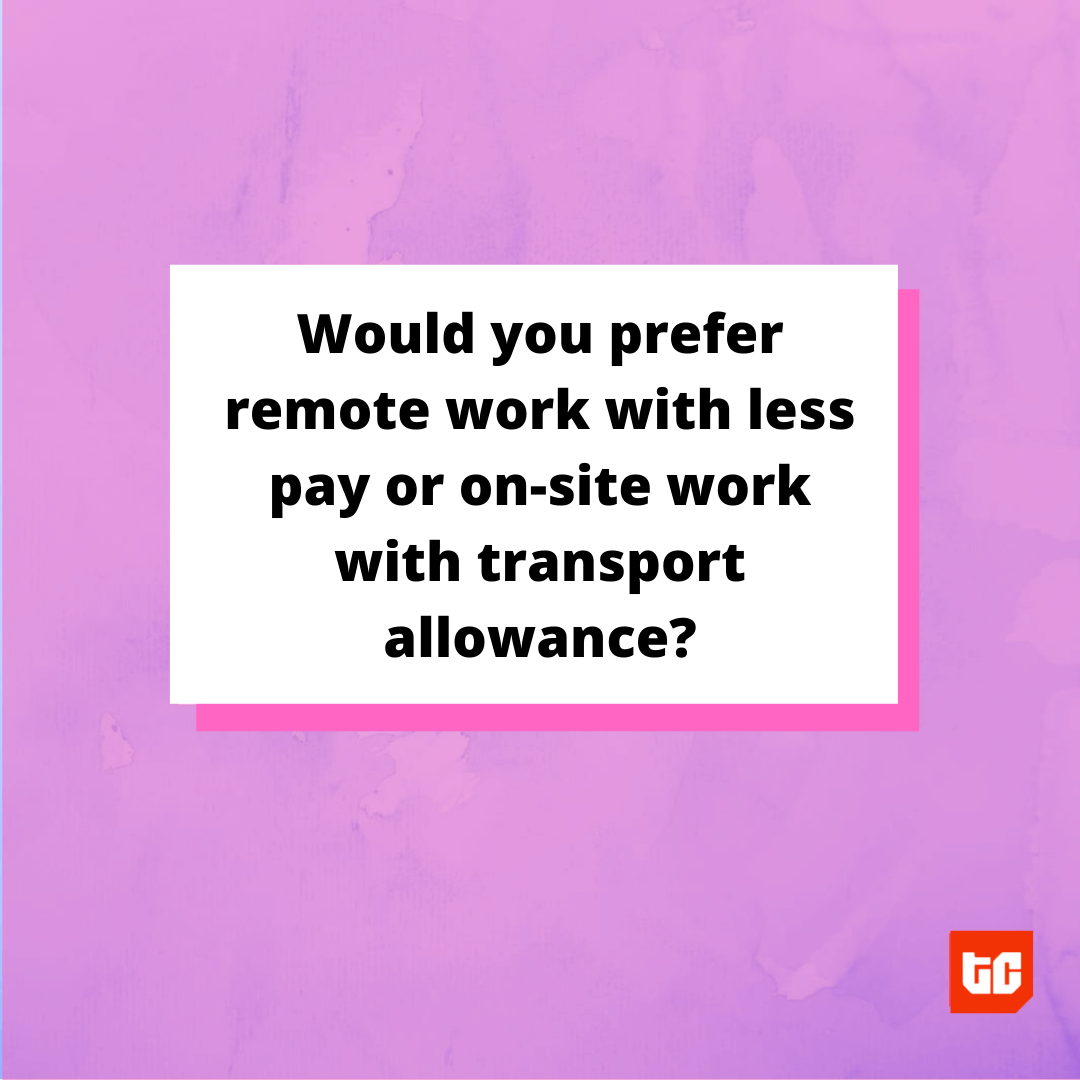
Last week, we asked if you would prefer to work remotely with less pay or on-site with transport allowance.
Our LinkedIn poll—answered by 267 people—showed that majority, about 71% would prefer remote work with less pay.
Check out a new edition of Tech probe in tomorrow’s newsletter. If you’ve got a tech dilemma you’d like to share, tell us.
JOB OPPORTUNITIES

We’re hiring for a couple of roles at Big Cabal Media (BCM). Supercharge your career with us! There are a few other openings too.
- Big Cabal Media – Sales Associate, SEO Editor, Paid Media Manager – Lagos, Nigeria
- Zikoko – Copywriter – Nigeria (Flexible)
- Paystack – Head of Finance, Automation Engineer – Africa (Remote)
- Microsoft – Senior Product Marketing Manager, Senior Data Technician – Johannesburg, South Africa
- Amref Health – Communications Officer, Business Development Manager – Nairobi, Kenya
There are more jobs here. You can also submit any listings you have at bit.ly/tcxjobs.
What else we’re reading
- Vault Hill is building a human-centric metaverse. What’s it about?
- What happens before a student fails WAEC? And how can we curb it?
- Here’s what Agnes Muthoni, Director of Strategic Partnerships at Andela, thinks about Web3.
- As Nvidia hacker deadline looms, 71,000 employee accounts have reportedly been exposed.


























